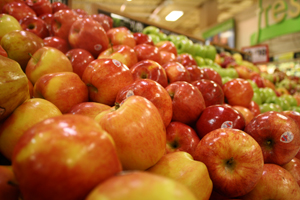Two Red Delicious apples sit beside each other at the market. Both are shiny, firm, and mouthwatering. There’s only one difference: one is labeled USDA Organic and the other is not.
This tiny sticker that sits atop the organic apple can make a world of difference. The apple is one of the fruits listed in the “Dirty Dozen,” a list of foods made up by gourmetfoods.com, which have the highest level of pesticide contamination according to the USDA (United States Department of Agriculture).
The other 11 “dirty” foods are peaches, bell peppers, celery, nectarines, strawberries, cherries, pears, grapes, spinach, lettuce, and potatoes.
A food is labeled as organic if it meets the USDA Organic guidelines, which means the food is 100 percent organic. According to the USDA Consumer Brochure, “Organic food is produced without using most conventional pesticides. Fertilizers made with synthetic ingredients or sewage sludge, bioengineering, or ionizing radiation.”
Beckie Gurley, owner of Calvert’s Gift Farm in Sparks, Maryland, is against the use of chemicals in foods. She questions the type of people who would put these toxins into their bodies. “Organic food is pesticide, herbicide, and fungicide free, as well as free of synthetic fertilizers. The FDA sets limits on how much of these chemicals can be on our food, but really, do you want to eat any of it? These chemicals are petroleum based,” Gurley said.
The processed foods that include high amounts of hormones, additives, and unnatural preservatives fill the shelves at every supermarket (80 percent of all shoppers don’t shop organic according to the Organic Consumers Association), mainly because the added chemicals elongate the food’s shelf life. However, these unnatural ingredients can shorten your life.
According to the Cancer Prevention Coalition, “EPA estimates show risks of up to 60,000 excess annual cancers when applied to the numerous pesticides contaminating a plateful of food.”
When buying food, the main ingredients to avoid are propyl gallate, BHA, BHT, potassium bromate, MSG, aspartame, sodium nitrate, and all food dyes. A study done by the Center for Science in the Public Interest found that all of these caused cancer in lab rats.
Organic farming ensures that the food is not only safe from pesticides but the environment is as well. “We don’t use synthetic fertilizers, pesticides, herbicides or fungicides. Our goal is to feed the soil, not just the plants. Healthy soil produces healthy plants. We look for a balance on our farm,” Gurley said.
The balance that Gurley seeks to find on her farm reflects on the type of balance people should seek to follow when eating. Avoiding as many added preservatives as possible will help people to maintain a healthy diet, Gurley said.
High fructose corn syrup is the number one dietary enemy according to an MSNBC health report. A Princeton University study found that the average person consumes 60 pounds of the sweetener per year. In the 30 years since the sweetener has been introduced, it has gone from accounting for less than one percent of caloric sweeteners to representing 42 percent because it is cheaper and sweeter, according to an MSN health report.
Organic food tends to be more expensive, but for different reasons. The cost to grow organic food is greater because of the growing techniques. It is much more expensive to hire people to constantly tend to the crops. The post-handling cost is also higher than conventional foods because the organic food cannot be contaminated while being shipped.
But with the cost aside, people often wonder if eating organic food will lower the amount of calories and fat. So will an organic cookie have less fat than a conventional cookie? The answer is no, not necessarily, but the organic cookie will be made with real, all natural ingredients.
Be wary of “diet” cookies and sweets. This often means the treat is made with more artificial sweeteners and hormones.
“The cookie industry loves to sell low fat, sugar free items because people perceive them to be healthier. Low fat and sugar free are indications to me that they are loaded with chemicals. I would rather eat sugar than a man made sugar substitute,” Gurley said. “Eating whole, unprocessed food is best for our bodies.”
Leah Polakoff is a reporter for jcpatriot.com.



